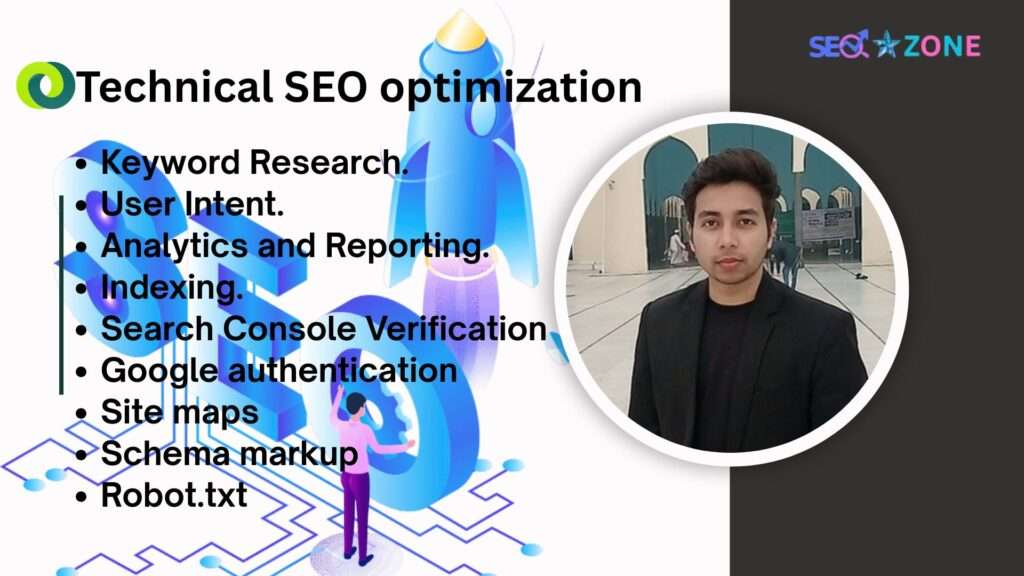Are you struggling with low traffic, poor rankings, or a slow website?
Let me help you uncover and fix the technical support analyst holding your site back!
I’m a Technical SEO expert with years of experience helping websites improve search visibility, user experience, and performance. Whether you’re running WordPress, Shopify, Wix, or a custom-built site — I’ve got you covered.

What’s Included:
✅ Full Technical SEO Audit
✅ Crawl Errors & Broken Links Fix
✅ Sitemap & Robots.txt Optimization
✅ Core Web Vitals & Site Speed Fixes
✅ Mobile-Friendliness & Indexability
✅ Structured Data (Schema) Check
✅ HTTPS, Canonical, and Redirect Issues
✅ Google Search Console & Analytics Setup
Platforms I Work With: WordPress, Shopify, Wix, Squarespace, Custom HTML

Why Choose Me?
✔️ 100% Manual Audit – No automated fluff
✔️ Detailed Report With Fixes & Recommendations
✔️ Fast Delivery + Ongoing Support
✔️ Google Best Practices & White Hat SEO Only
Feel Free to contact me before placing the order.
FAQ:
1. What is Technical SEO?
Technical SEO refers to the process of optimizing a website’s infrastructure so that search engines can crawl, index, and render it effectively. It involves elements like site speed, mobile-friendliness, structured data, XML sitemaps, and canonical URLs.
2. Why is Technical SEO important?
Without strong technical SEO, even high-quality content may not be discovered or ranked properly by search engines. It ensures that your site is accessible, fast, secure, and correctly interpreted by crawlers.
3. What are the key components of Technical SEO?
- Crawlability & Indexability (robots.txt, XML sitemaps, noindex tags)
- Site Speed & Performance (Core Web Vitals, lazy loading)
- Mobile-Friendliness (responsive design, mobile usability)
- Secure Connections (HTTPS)
- Canonicalization (avoiding duplicate content issues)
- Structured Data (Schema.org markup for enhanced SERP appearance)
- URL Structure (clean, keyword-rich, consistent URLs)
- 404 Pages & Redirects (proper error handling and redirection)
4. How do I check if my site is mobile-friendly?
Use Google’s Mobile-Friendly Test. It evaluates how easily a visitor can use your page on a mobile device.
5. What is a sitemap and why do I need one?
A sitemap is an XML file that lists your website’s important pages, helping search engines discover and index them more effectively. Submitting a sitemap to Google Search Console can improve crawl coverage.
6. What are Core Web Vitals?
Core Web Vitals are a set of user-focused metrics by Google that measure real-world experience:
- Largest Contentful Paint (LCP): Loading performance
- First Input Delay (FID): Interactivity
- Cumulative Layout Shift (CLS): Visual stability
7. How does HTTPS affect SEO?
HTTPS encrypts data between your site and users, improving security and trust. Google uses HTTPS as a ranking signal.
8. What is a canonical URL?
A canonical URL is the preferred version of a webpage when there are duplicates. Technical support analyst helps prevent duplicate content issues by consolidating ranking signals to the chosen version.
9. How can I improve my website’s crawlability?
- Ensure your robots.txt doesn’t block important pages
- Create and submit an XML sitemap
- Use internal linking effectively
- Avoid orphan pages (pages with no links to them)
10. How often should I perform a technical SEO audit?
A full Technical support analyst audit is recommended every 3–6 months or after major site updates. Regular monitoring of key metrics (e.g., crawl errors, page speed) should be ongoing.
